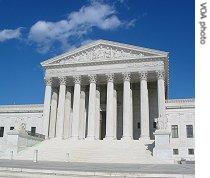2006年VOA标准英语-South Dakota a Battleground in Abortion Debate(在线收听)
By Mike O'Sullivan
Los Angeles
03 October 2006
A landmark decision by the U.S. Supreme Court legalized abortion in 1973, but the issue remains divisive. The latest battleground is the state of South Dakota, where voters will decide in November whether to ban abortions. Both sides say the debate has national implications.
-----
 US Supreme Court, Washington DC |
||
"The night before oral argument, I felt the weight of the world on my shoulders because if you can't control your body, your reproductive decisions, then there's so little else about family size or employment or health or so many other things you can't control. And so I really felt so intensely how important this case was," she said.
Weddington says the case was about choice, and the court decided that most laws that ban abortion violate a constitutional right to privacy. Those on the other side of the issue, who call themselves "pro-life," say the case was not about women's rights, or about privacy. David Bereit of the American Life League says it was not about the right to choose, either.
"Because really you have to ask, what is the choice? What is it that they want to be private? What they want a choice for is the violent, unjust act of abortion, that destroys a living, pre-born person in the womb," he said.
Legislators in South Dakota passed a law this year that banned most abortions, and the governor signed the bill. An exception is made for abortions done to save the life of the mother.
Pro-choice groups quickly collected signatures to get a measure on the ballot challenging the law, and voters will make their choice November 7.
Sarah Weddington says the dispute has national implications. David Bereit agrees.
" We know of at least 12 other states right now that are lined up to introduce similar abortion bans, and there will probably be more," he added. "So what happens on November 7 in South Dakota is going to affect the future of America."
Both sides say the South Dakota vote could go either way. Whatever happens, the debate will not end in November. If the abortion ban survives, pro-choice groups will challenge it in the courts, and the case will eventually reach the US Supreme Court.
Most analysts say the pro-choice side has the edge on the court today. David Bereit says that could change, however.
"Some have speculated that right now, it's four votes [on the Supreme Court] that would vote to overturn Roe versus Wade, and five votes that would vote to uphold it currently, and that one change of a justice that has voted historically in support or affirmation of the Roe versus Wade decision could overturn Roe," he noted.
That possibility brings the debate back to politics. A single retirement by a Supreme Court justice could change the court's direction. In the event of a retirement, President Bush, an abortion opponent, would name a replacement. Supreme Court appointments must be confirmed by the Senate, where Mr. Bush's Republican Party now has a majority. Analysts say because of that, the senate would be inclined to approve his nominee. Both the pro-choice and pro-life sides will be closely monitoring the election.
Sarah Weddington says women have always found ways to get abortions, and since the procedure was legalized 33 years ago, they can do it safely.
She says she remembers conditions before that.
"That was when doctors often were talking in our public hospitals about IOB, 'infected obstetrics wards,' where they with their residents and interns were trying to deal with women who had done self-abortion, had illegal abortions that left them with infections and all kinds of problems," she recalled.
David Bereit says abortion is unsafe, even performed by a doctor.
"Many women have died from abortions," he said. "Tens and hundreds of thousands more have been wounded emotionally, spiritually, psychologically by abortions. And so we can't accept the misnomer that abortion is currently safe."
Pro-choice advocates say the pro-lifers are distorting the medical data.
Neither side is willing to compromise. Pro-life advocates say human life begins at conception and that abortion at any stage kills an unborn child. Pro-choice supporters say the issue is difficult and that the decision should be left to a woman and her doctor.
Both sides agree that the debate will intensify and be argued state-by-state, as well as at the national level in Washington. Any abortion law is likely to be challenged, with the final decision left to the Supreme Court. This term, the high court will review a federal law that bans a late-term procedure that critics call a partial birth abortion. Lower courts have struck down the ban, which Congress approved in 2003.